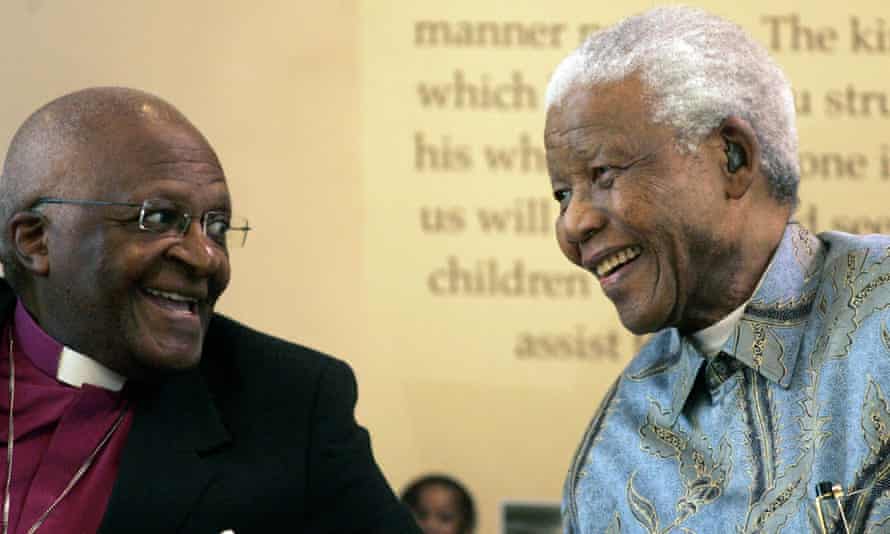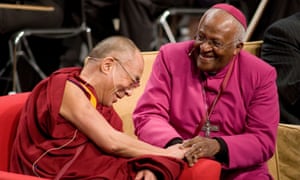Nobel Peace Prize awardee Desmond Tutu was a renowned South African Anglican cleric known for his staunch opposition to the policies of apartheid. Despite bloody violations committed against the black population in South Africa during Apartheid, Tutu adhered to his nonviolent line. Since, he emerged as a global voice for peace, reconciliation, and social justice around the world.
Tutu, described by foreign observers and people in his country as the moral conscience of the nation, died in Cape Town on Boxing Day.
“The passing of archbishop emeritus Desmond Tutu is another chapter of bereavement in our nation’s farewell to a generation of outstanding South Africans who have bequeathed us a liberated South Africa,” the president, Cyril Ramaphosa, said.
“From the pavements of resistance in South Africa to the pulpits of the world’s great cathedrals and places of worship, and the prestigious setting of the Nobel peace prize ceremony, the Arch distinguished himself as a non-sectarian, inclusive champion of universal human rights.”
Tutu was diagnosed with prostate cancer in the late 1990s and in recent years he was hospitalised on several occasions to treat infections associated with his treatment.
“Ultimately, at the age of 90, he died peacefully at the Oasis Frail Care Centre in Cape Town this morning,” Dr Mamphela Ramphele, acting chairperson of the Archbishop Desmond Tutu IP Trust and coordinator of the office of the archbishop, said in a statement on behalf of the Tutu family. She did not give details on the cause of death.
Bishop Desmond Tutu was born in 1931 in Klerksdorp, Transvaal. His father was a teacher, and he himself was educated at Johannesburg Bantu High School. After leaving school he trained first as a teacher at Pretoria Bantu Normal College and in 1954 he graduated from the University of South Africa. After three years as a high school teacher, he began to study theology, being ordained as a priest in 1960.
The years 1962-66 were devoted to further theological study in England leading up to a Master of Theology. From 1967 to 1972 he taught theology in South Africa before returning to England for three years as the assistant director of a theological institute in London. In 1975 he was appointed Dean of St. Mary’s Cathedral in Johannesburg, the first black to hold that position. From 1976 to 1978 he was Bishop of Lesotho, and in 1978 became the first black General Secretary of the South African Council of Churches. Tutu is an honorary doctor of a number of leading universities in Britain, the USA and Germany.
As a cleric, he travelled widely, gaining an MA in theology from London University. Though he only emerged as a key figure in the liberation struggle in the mid-1970s, he was to have a huge impact, becoming a household name across the globe.
As the government became increasingly oppressive — detaining Black people, establishing onerous laws — Tutu became increasingly outspoken.
“He was one of the most hated people, particularly by White South Africa, because of the stance he took,” former Truth and Reconciliation Commission member Alex Boraine stated.
An interview with Frost captured the essence of Desmond Tutu more than any other. The archbishop takes Sir David Frost on a tour of his beloved South Africa; he talks about his time in the anti-apartheid struggle movement, his work with the TRC, and his alarm over recent developments in the “rainbow nation”.
Not going quietly: Frost Interview – Desmond Tutu
Excitable, emotional, charismatic and highly articulate, Tutu won the Nobel peace prize in 1984. A vocal supporter of sanctions against South Africa, he was detested by supporters of the apartheid regime, who saw him as an agitator and traitor. Tutu was however protected not just by his wit and combative spirit but by his immense popularity and respect. In 1986 he was appointed archbishop of Cape Town, the effective head of the Anglican church in his homeland.
The Peace Prize award made a big difference to Tutu’s international standing, and was a helpful contribution to the struggle against apartheid. The broad media coverage made him a living symbol in the struggle for liberation, someone who articulated the suffering and expectations of South Africa’s oppressed masses. There are many indications that Tutu’s Peace Prize helped to pave the way for a policy of stricter sanctions against South Africa in the 1980s.
Tutu always kept his distance from the African National Congress (ANC), the party which spearheaded the liberation movement and has now been in power in South Africa for more than 20 years. He refused to back its armed struggle and support unconditionally leaders such as Nelson Mandela.
However, Tutu shared Mandela’s vision of a multiracial society in which all communities live together without rancour or discrimination and is credited with coining the phrase “rainbow nation” to describe this vision.
Desmond Tutu formulated his objective as “a democratic and just society without racial divisions”, and set forward the following points as minimum demands:
1. equal civil rights for all
2. the abolition of South Africa’s passport laws
3. a common system of education
4. the cessation of forced deportation from South Africa to the so-called “homelands”
Despite bloody violations committed against the black population, as in the Sharpeville massacre of 1961 and the Soweto rising in 1976, Tutu adhered to his nonviolent line.
Healing South Africa’s wounds
“Forgiveness is not just an altruistic act, but one born of self-interest. Forgiveness helps give people the resilience to survive and remain human in the face of all efforts to dehumanise them.” -DESMOND TUTU
Tutu’s work was not done, however. In 1995 Mandela appointed him chair of the Truth and Reconciliation Commission to address the human rights violations of the apartheid years.
The TRC gave its report to the government in 1998. Tutu established the Desmond Tutu Peace Trust the same year.
He returned to teaching, becoming a visiting professor at Emory University in Atlanta for two years and later lecturing at the Episcopal Divinity School in Cambridge, Massachusetts. He published a handful of books, including “No Future Without Forgiveness” (1999), “God Is Not a Christian” (2011), and a children’s book, “Desmond and the Very Mean Word” (2012).
He retired from public service in 2010 but remained unafraid to take controversial positions. He called for a boycott of Israel in 2014 and said that former Prime Minister Tony Blair and former US President George W. Bush should be “made to answer” at the International Criminal Court for their actions around the Iraq war.
Around the world, there have been tributes to this remarkable man.
Mandela, who lived near Tutu’s home in Soweto and also won the Nobel prize, described his close friend as “sometimes strident, often tender, never afraid, seldom without humour”.

“Desmond Tutu’s voice will always be the voice of the voiceless,” Mandela said.
In 2009 Barack Obama described Tutu as “a crusader for freedom, a spiritual leader … and a respected statesman [who] has become a symbol of kindness and hope far beyond the borders of his native land”.
Friends remembered Tutu as a man of deep faith whose charm, warmth and intelligence few could resist, and who was happiest when active on behalf of others.
“I love to be loved,” he told the BBC’s Sue Lawley when appearing on Desert Island Discs in 1994.
Dalai Lama pays tribute to ‘true humanitarian’ Tutu
The Dalai Lama paid tribute to Desmond Tutu who he said was fully dedicated to serving others and a “true humanitarian”.
Tibet’s spiritual leader said: “The friendship and the spiritual bond between us was something we cherished.
Archbishop Desmond Tutu was entirely dedicated to serving his brothers and sisters for the greater common good. He was a true humanitarian and a committed advocate of human rights”.

Reuters compiled some of Tutu’s best known quotes:
“Don’t raise your voice. Improve your argument”.
“We need to stop just pulling people out of the river. We need to go upstream and find out why they’re falling in”.
“Hope is being able to see that there is light despite all of the darkness”.
“Without forgiveness, there’s no future”.
“Do your little bit of good where you are; it’s those little bits of good put together that overwhelm the world”.
“I wish I could shut up, but I can’t, and I won’t”.
Many will remember him for his distinguished sense of humour, embodied in a distinctive, giggle-like laugh but mostly as a man that had the ability to bring light to some of the darker sides of humanity.
Tutu is survived by his wife of more than 60 years, Nomalizo Leah Tutu, with whom he had four children, Trevor, Theresa, Naomi and Mpho.
Support Independent Journalism Today
Our unwavering dedication is to provide you with unbiased news, diverse perspectives, and insightful opinions. We're on a mission to ensure that those in positions of power are held accountable for their actions, but we can't do it alone. Labour Heartlands is primarily funded by me, Paul Knaggs, and by the generous contributions of readers like you. Your donations keep us going and help us uphold the principles of independent journalism. Join us in our quest for truth, transparency, and accountability – donate today and be a part of our mission!
Like everyone else, we're facing challenges, and we need your help to stay online and continue providing crucial journalism. Every contribution, no matter how small, goes a long way in helping us thrive. By becoming one of our donors, you become a vital part of our mission to uncover the truth and uphold the values of democracy.
While we maintain our independence from political affiliations, we stand united against corruption, injustice, and the erosion of free speech, truth, and democracy. We believe in the power of accurate information in a democracy, and we consider facts non-negotiable.
Your support, no matter the amount, can make a significant impact. Together, we can make a difference and continue our journey toward a more informed and just society.
Thank you for supporting Labour Heartlands











